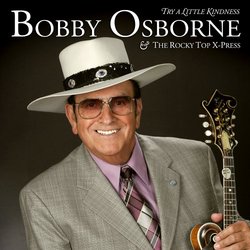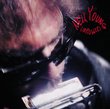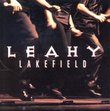| All Artists: Bobby Osborne & Rocky Top X-Press Title: Try a Little Kindness Members Wishing: 0 Total Copies: 0 Label: Rounder / Umgd Original Release Date: 1/1/2006 Re-Release Date: 2/28/2006 Genres: Country, Pop Styles: Bluegrass, Classic Country Number of Discs: 1 SwapaCD Credits: 1 UPC: 011661055223 |
Search - Bobby Osborne & Rocky Top X-Press :: Try a Little Kindness
 | Bobby Osborne & Rocky Top X-Press Try a Little Kindness Genres: Country, Pop
Bluegrass owes a lot to Bobby Osborne. As one half of the legendary Osborne Brothers, he pioneered a powerfully forward-thinking, harmony-driven style that introduced bluegrass to generation after generation through its in... more » |
Larger Image |
CD DetailsSynopsis
Album Description Bluegrass owes a lot to Bobby Osborne. As one half of the legendary Osborne Brothers, he pioneered a powerfully forward-thinking, harmony-driven style that introduced bluegrass to generation after generation through its inventiveness and enduring popular appeal. Today, at an age when many performers are considering retirement, Bobby Osborne continues to refine his music and share it with the world. Longtime Osborne followers will find 'Try a Little Kindness' to contain some of Bobby Osborne's finest singing and mandolin playing of the past three decades. Newcomers will be astonished to hear just how contemporary Osborne sounds - a testament to both his immense influence on modern bluegrass and his unwavering passion and ability. Similarly Requested CDs
|
CD ReviewsFine singing & playing continue to build the reputation and J. Ross | Roseburg, OR USA | 03/14/2006 (5 out of 5 stars) "Playing Time - 39:05 -- Originally from Hyden, Ky., mandolinist Bobby Osborne's musical career began over fifty years ago (in 1949) with banjo player Larry Richardson, Charlie and Ray Cline in a group called The Lonesome Pine Fiddlers. He would've been about 18 years old. By 1953, Bobby and his banjo-playing brother, Sonny, were working with Jimmy Martin. With Red Allen singing lead, the Osborne Brothers formed their own band in 1955 and joined the Grand Ole Opry in 1964. Bobby's tenor and then his high lead vocals got folks to really sit up and take notice. So did his instrumental talent on the mandolin, a personalized style based largely on single-line melodies after he had learned to play electric guitar and fiddle at an early age. Bobby doesn't like to hear guys get completely away from the melody and just play a bunch of notes. Fast forward through about forty years of hits, awards, and even some controversy about electric instruments, we are now treated to Bobby Osborne & The Rocky Top X-Press' debut release on the Rounder label. Following surgery on his shoulder, Sonny no longer plays banjo or tours extensively.
The project's diverse material is drawn from an interesting variety of sources - Jake Landers, Carter Stanley, Hazel Dickens, Bill Monroe, Bailes Brothers, as well as Kris Kristofferson, Bobby Austin, Bill Anderson, and Paul Simon. The juxtaposition of the traditional and contemporary has always been a stamp of the Osborne sound. Eddie Stubbs' 11 pages of liner notes make reference to their trademark commercial, radio-friendly, strong material. This project balances new material with songs that have been around for decades. I especially enjoyed the Bobby Osborne/Pete Goble 1971 composition (until now unreleased) called "It's Gonna Be Raining `Til I Die." Bobby's "Rocky Top X-Press" demonstrates his fluency in the string language of mandolinese, and Glen Duncan's twin fiddles and Dana Cupp's banjo really supercharge the instrumental. The Bailes Brothers' "We're Living in the Last Days Now" is a beautiful and inspirational song with a message as relevant today as it was when written decades ago. Besides Duncan and Cupp, other instrumental support is rendered by Daryl Mosley (bass), Bobby Osborne Jr. (rhythm guitar), and Tim Graves (dobro). Harmony vocals are sung by Duncan and Mosley, although Josh Turner's "Long Black Train" features five voices in the full-bodied background vocals. Over the years, the Osborne sound and arrangements were built largely around the high lead being featured in contemporary country songs. While their complex trios used ideas borrowed from pedal steel or elaborate and flashy endings, you'll find them a little more conservative on "Try A Little Kindness." The trios in the more traditional "The Fields Have Turned Brown" and "Mansions for Me" are actually among my favorites here. Bobby once admitted that it is his singing that got him to where he's at. And while folks rave about Bobby's powerful vocalizing on this album, don't overlook his solid mandolin playing. "Try a Little Kindness" shows that 74-year-old bluegrass pioneer Bobby Osborne has no immediate plans to retire, and he continues to cultivate his polished music. Bobby feels that he's singing better now than he has in ten years. With fine singing and playing, this album continues to build the reputation and legacy of Bobby Osborne as singer, mandolinist, teacher and entertainer. (Joe Ross, staff writer, Bluegrass Now) " |

 Track Listings (12) - Disc #1
Track Listings (12) - Disc #1








